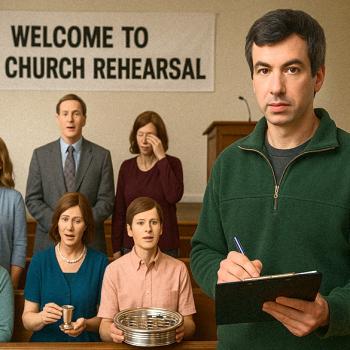
This is what deconstruction actually looks like: not a rebellion, not a trend, not a TikTok phase. Just a slow unraveling of inherited certainty in pursuit of something more honest. Alex O’Connor’s recent interview with Rhett McLaughlin—yes, that Rhett from Rhett & Link and Good Mythical Morning—is a fantastic example of a faith journey that had the audacity to keep going when the system around it begged him to stop.
Rhett’s story isn’t about “losing faith.” It’s about following it far enough that it no longer needed to prop up certainty to survive. Spoiler: that’s not a loss. That’s growth.
Certainty: The Evangelical Placebo
Rhett was a Campus Crusade guy. Professional Christian. Evangelism-trained, gospel-tract-wielding, 4-Spiritual-Laws-certified missionary. He knew the code. He believed he was right. He even pitied those who weren’t. In his own words, he was grateful every night that he had “the truth” while others didn’t.
That’s not unique to Rhett. It’s standard-issue evangelical software. Faith becomes a list of propositional statements you affirm. Not because you’ve wrestled with them, but because questioning them means you’re already on the path to hell. It’s less faith and more theological Stockholm syndrome.
But here’s the kicker: the first domino didn’t fall because Rhett stopped believing in God. It fell when he realized he might be wrong about evolution. And if he was wrong about that—something he’d argued against for years—what else had he misunderstood? That wasn’t deconversion. That was just the courage to ask a better question.
The Difference Between Needing Something to Be True and Seeking What Is True
There’s a moment in the interview where Rhett describes reading The Language of God by Francis Collins. It undid him. Not because it attacked his faith, but because it showed how flimsy his framework was when held up to the light. It wasn’t the science that scared him. It was realizing he’d built his belief system backwards: starting with conclusions and retrofitting the evidence.
Christian apologetics often functions like a spiritual PR campaign. It isn’t about discovery—it’s about spin. You already know the answer; your job is to make it sound palatable. But truth doesn’t need spin. It doesn’t need to be propped up by a rebranding team.
Faith, when it’s honest, starts with maybe. It sits in the discomfort. It admits what it doesn’t know. And it stops demanding that God fit into a sermon slide.
When Jesus Gets Interesting Again
One of the most striking parts of Rhett’s story is how Jesus never really goes away. In fact, once the church-y dogma starts peeling off, Jesus gets more compelling. More radical. More honest. Less like a motivational speaker and more like a first-century weirdo with a bad habit of loving the wrong people.
That says something.
When you stop needing Jesus to be a brand ambassador for your doctrine, you actually start hearing him again. And not the filtered Sunday School version—the disruptive one who flips tables and tells rich guys to give their stuff away. The one who never once said, “Agree with these ten beliefs and you’ll be saved.”
The Slow Death of Certainty
Deconstruction isn’t a one-and-done. Rhett didn’t wake up one day and toss his Bible into the sea. It was years of wrestling. Of reading. Of holding questions that had no tidy answers. And eventually, of being okay with not knowing.
That’s faith too.
Not the kind you can sell in a Christian bookstore, but the kind that stays with you when the lights are off and you’re wondering if the silence is holy or just empty. The kind that doesn’t demand applause or assurance. The kind that whispers, “Keep going.”
A Final Thought for the Certainty Addicts
If your faith can’t survive being questioned, it wasn’t faith. It was compliance.
And if your Jesus disappears the moment the church loses control of him, maybe you weren’t following Jesus. Maybe you were following the system that borrowed his name.
Rhett didn’t lose faith. He let it evolve. Which is kind of poetic, considering.
For more Snarky Faith, check out the podcast and more:
- Snarky Faith website
- Snarky Faith on Instagram: @stuartdelony
- Snarky Faith on YouTube: @snarkyfaith
- Snarky Faith on Bluesky: @snarkyfaith.bsky.social
- Snarky Faith Group on Facebook: www.facebook.com/snarkyfaith
- Snarky Faith t-shirts and mugs available here.














